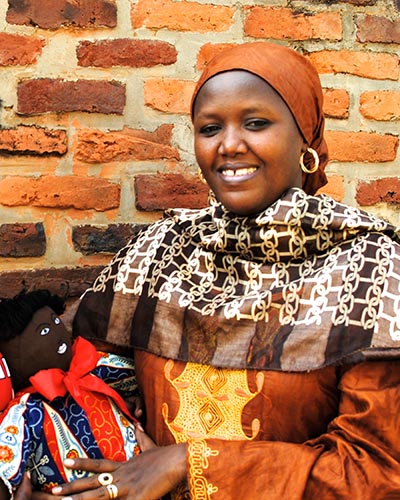By: Kate Doyle
About 150 hand-made dolls are on their way to being used in the MenCare+  program, a four-country initiative to engage men as caregiving partners in
program, a four-country initiative to engage men as caregiving partners in
sexual and reproductive health, especially maternal and child health. In Rwanda, Equimundo and the Rwanda Men’s Resource Center (RWAMREC) aim to involve more than 2,000 Rwanda men in fatherhood group education in order to challenge harmful gender norms and promote men’s involvement as equitable, non-violent caregivers and fathers. The fathers’ groups are an important way of engaging men in caregiving and challenging gender inequalities from the very beginning of their child’s life.
RWAMREC has partnered with the Tubahumurize Cooperative in Rwanda to locally produce more than 100 hand-made dolls. The Tubahumurize Cooperative was founded in 2006 with a mission to empower socially and economically marginalized women. Most of the cooperative’s members are survivors of gender-based violence and many are living with HIV. Tubahumurize provides its members with counseling services, nutritional support, skills training and access to micro-finance opportunities. To date, the cooperative has helped 387 women and more than 1,000 children.
The dolls are currently being produced by a number of women at the cooperative’s headquarters in Kigali. Sewing and embroidery are just a few of the skills taught to the women who participate in the cooperative. With the skills they have learned, cooperative members create unique handicrafts to be sold in their own boutique or through special orders, enabling them to earn money to support themselves and their families. Equimundo and RWAMREC are pleased to partner with Tubahumurize, an organization whose vision is closely aligned with the objectives of the MenCare campaign.
The first prototypes of the dolls are already available and are being used in the development of a fatherhood program to be launched D4D 5with expectant fathers and their partners in four districts of Rwanda. The dolls will be used as didactic materials in the fatherhood groups, where fathers-to-be will learn tangible skills like how to properly hold, bathe and care for their new babies. Men who participate in the fathers’ groups will also learn how to support their partners during pregnancy, prevent violence in the family and the benefits of a more equitable distribution of household and care work.
Once all of the dolls are produced, they will be put directly to use in fatherhood groups led by more than 50 trained group facilitators. The fathers groups will be piloted at the end of this year and will eventually reach at least 2,000 men by 2015.
This project was funded by Catapult.